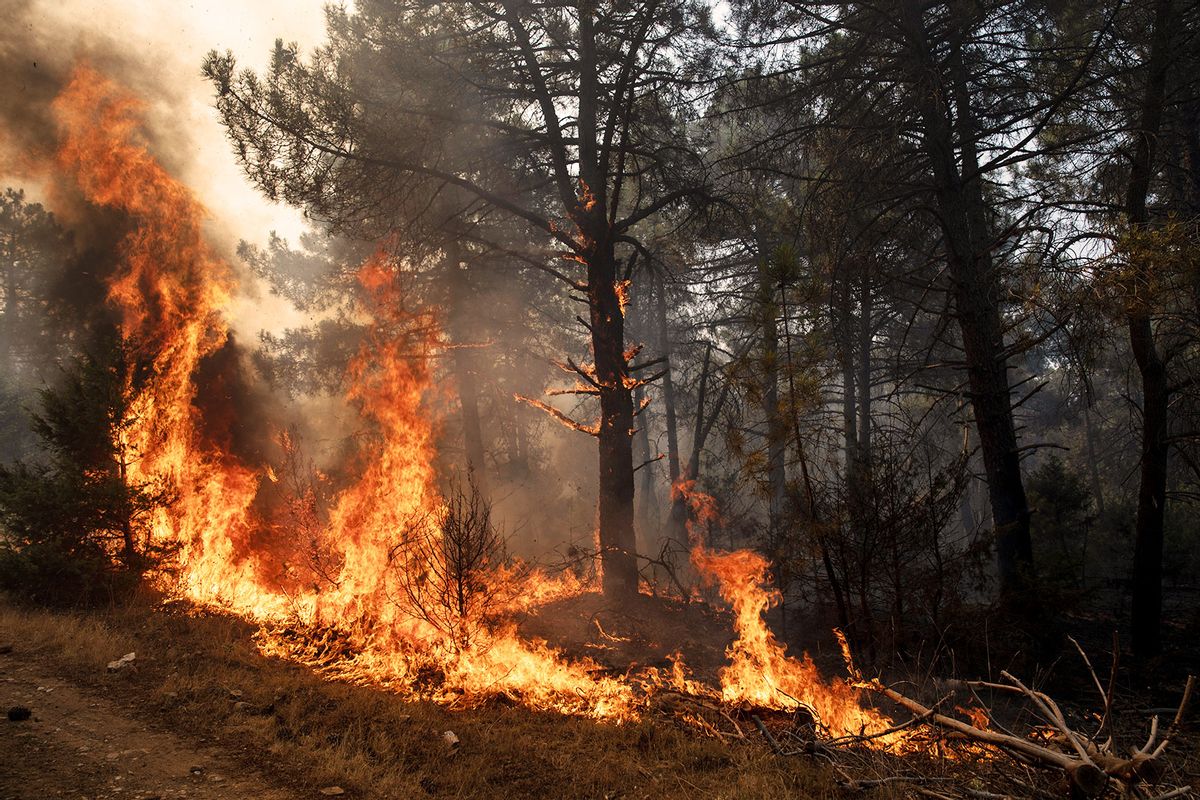Current and future risks from climate change are far worse than previously estimated, but urgent action is still possible to "secure a liveable future for all."
That's the message the world's foremost authority on climate change delivered on Monday as it published the final part of its latest major assessment, a "synthesis" outlining the peril humanity faces from greenhouse gas emissions — and what we can do to avoid it.
The release is from the Intergovernmental Panel on Climate Change, or IPCC, a United Nations body of leading climate experts from around the world. Every few years since its founding in 1988, the group has published a major assessment on the latest climate science — including how climate change is impacting people and nature and what the world can do to mitigate it. The newest publication is an attempt to distill everything the panel has said since August 2021, when it began releasing its sixth assessment of global warming.
There's no new research in this latest report, but it injects new urgency into scientists' and activists' calls for rapid, systemic action from global decision-makers. It comes ahead of the annual U.N. climate conference in November, where global leaders will complete a two-year evaluation of their climate commitments and determine what more is needed to keep global warming in check.
"The choices and actions implemented in this decade will have impacts now and for thousands of years," the report says.
Drawing on the IPCC's previous publications, the report says global temperatures have risen 1.1 degrees Celsius (2 degrees Fahrenheit) since preindustrial times, and that this warming has "unequivocally" been caused by human activities, primarily burning fossil fuels. Melting ice caps and ocean expansion have contributed to sea-level rise of nearly eight inches, heat waves and flooding have become more prevalent, and damage to the natural world is worse and more widespread than ever before.
Meanwhile, world leaders have lost precious time to keep things from getting worse. Without "rapid and deep" reductions in global emissions, the IPCC authors warn that the world will be unable to keep global warming below international temperature targets. Shortfalls in nature protections, infrastructure upgrades, and climate finance to the developing world mean disasters like wildfires and hurricanes will intensify across virtually every region of the world, outrunning nature and humanity's capacity to adapt to them. These impacts will escalate with every fraction of a degree of warming, as will the likelihood of breaching so-called "tipping points" — thresholds beyond which lie irreversible changes to the planet, like the collapse of the Greenland and West Antarctic ice sheets or the the abrupt halt of climate-regulating ocean currents.
Poor and vulnerable populations that have contributed the least to global warming are already facing its most severe impacts, including higher risks from heat-related mortality, food- and water-borne illness, and famine, according to the IPCC authors.
The report holds out hope, however, reiterating previous messaging about a "rapidly closing window of opportunity to enable climate resilient development." There is already enough global capital to foot the bill for necessary climate mitigation and adaptation, and the plummeting cost of renewables like solar and wind has made it easier than ever to pay for a transition away from fossil fuels.
The IPCC authors say it's still possible to limit global warming to 1.5 degrees C (2.7 degrees F) — the target enshrined in the 2015 Paris Agreement and a touchstone for climate action around the world — even as some scientists say it is no longer attainable. Achieving 1.5 degrees C would require cutting global emissions 43 percent below 2019 levels by 2030; currently, they're at record highs, and the world remains deeply dependent on fossil fuels. A U.N. report from October found that countries' climate policies and planned fossil fuel projects would cause nearly 3 degrees C (5.4 degrees F) of warming by mid-century.
Piers Foster, a professor of climate physics at the University of Leeds in the United Kingdom and an IPCC author, told journalists last week that even the most "optimistic" pathways for climate action will likely cause global temperatures to hit 1.5 degrees C. "If we don't radically change," he said, "we will go past 1.5 degrees in the early 2030s, and we'll also potentially go past 2 degrees." Some of the IPCC's temperature projections involve temporarily "overshooting" these temperature targets; although it's possible temperatures could restabilize, the consequences of such an overshoot are poorly understood and extremely risky.
The synthesis report is expected to inform negotiations at this year's U.N. climate conference, COP28, to be held in Dubai this fall. At the conference, world leaders will conclude the first "global stocktake," a two-year process in which they evaluate and report their progress toward the goals of the Paris Agreement. These stocktakes are set to take place every five years, and this first one is supposed to help countries identify ways to up their climate commitments for 2035.
Environmental groups hope the IPCC's synthesis report will guide countries toward climate actions that are in line with the latest science, including a new benchmark highlighted in the IPCC report saying that global emissions must fall 60 percent by 2035 in order to limit global warming to 1.5 degrees C. Peter Riggs, co-coordinator of the Climate Land Ambition and Rights Alliance — an international network of environmental organizations — said countries should prioritize "immediate, drastic, deep" emissions reductions above creative carbon accounting.
"I'm most concerned about what feels like a willful misinterpretation of IPCC findings," Riggs told Grist. Although the IPCC has made it clear that reaching key climate goals will require carbon removal — sucking carbon dioxide molecules out of the air and storing them permanently in rock formations — Riggs said some countries have interpreted this recommendation as permission to use carbon removal to offset ongoing emissions from fossil fuel burning and heavy industry. For example, a last-minute change to the agreement made at COP26 in 2021 called for a phasedown of "unabated" coal-fired power plants, implying that coal is OK as long as some of the greenhouse gas emissions from burning it are sequestered.
"Removals should be used for survival purposes, for hard-to-abate emissions," Riggs said. "But we're not even close to that point yet."
Otherwise, the IPCC urges decision-makers to make dramatic changes to all sectors of society — including radically expanding access to clean energy technologies, low-carbon transportation, and healthy and sustainable foods, as well as conserving 30 to 50 percent of the planet's land and water. Many of these interventions would pay for themselves — if not by reducing the likelihood of costly climate disasters, then by improving public health because of reduced pollution from fossil fuels.
After decades of empty words and broken promises from world governments, the changes called for are massive in scale. U.N. Secretary-General António Guterres said they would require "a quantum leap in climate action." He used the IPCC report's launch to propose a "Climate Solidarity Pact" for the most polluting countries, including the United States, China, Saudi Arabia, and members of the European Union. Guterres said signatories of the pact should adopt a handful of commitments "in a common effort to keep 1.5 degrees alive": absolutely no more coal use, no new or expanded oil and gas infrastructure, and a phaseout plan for existing fossil fuel reserves, among other goals.
"This report is a clarion call to massively fast-track climate efforts," Guterres said. "In short, our world needs climate action on all fronts — everything, everywhere, all at once."
This article originally appeared in Grist at https://grist.org/science/immediate-action-is-needed-to-ensure-a-livable-future-for-all-un-climate-panel-says/.
Grist is a nonprofit, independent media organization dedicated to telling stories of climate solutions and a just future. Learn more at Grist.org




Shares